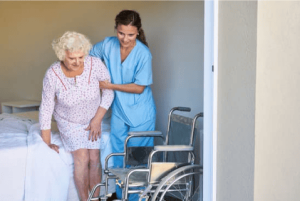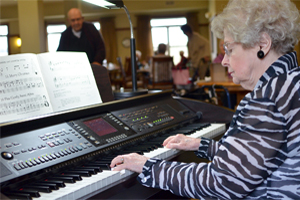Our ability to communicate is fundamental to connecting with those around us. However, individuals with aphasia often struggle with speaking, understanding, reading, and writing. Aphasia is a communication disorder that affects a person’s ability to use language, making it challenging for seniors to connect with others. It can occur in seniors with Alzheimer’s disease and often follows a stroke or other brain injury, predominantly affecting older adults. A senior with aphasia can greatly benefit from the support of their loved ones, which requires patience, understanding, and effective communication strategies. With our help, seniors with aphasia can regain some of their confidence. Here are some ways we can support seniors with aphasia:
1. Become Educated About Aphasia
Understanding aphasia is the first step in providing effective support. There are different types of aphasia, each presenting unique challenges:
– Expressive Aphasia: Difficulty in expressing thoughts or choosing the right words.
– Receptive Aphasia: Difficulty in understanding language, making communication with others hard.
Aphasia can manifest as poor speech fluency, reduced vocabulary, and comprehension difficulties. It can also impact memory and problem-solving skills, making it hard for seniors to make decisions.
2. Create a Supportive Environment
Creating a supportive environment involves providing a calm, quiet, and distraction-free space to help seniors focus on communication. Many seniors with aphasia feel ashamed of their communication disorder, leading to depression and isolation. Caregivers can help by listening patiently and intervening when communication breaks down. Encourage seniors to engage with their community, as social interaction can boost their confidence and overall well-being. Educate families about aphasia and effective communication strategies to encourage a supportive network.
3. Use Simple and Clear Communication
When communicating with seniors with aphasia, use simple, short, and clear messages. Avoid advanced vocabulary and repeat important information if necessary. Allow extra time for them to respond without rushing or speaking for them, as this can be upsetting.
4. Incorporate Non-Verbal Communication
Non-verbal communication can significantly aid those with aphasia. Here are some strategies:
– Pictures: Create a book of laminated photos with familiar people, objects, and places. This can help them communicate by pointing to images.
– Whiteboard or Chalkboard: Let them write down key words, draw, or jot down what you have said.
– Communication Devices or Apps: Use apps that reinforce words with both photos and text by saying the word when the photo is selected.
– Pointing and Nodding: Encourage them to use gestures like pointing and nodding to express themselves.
5. Engage in Meaningful Activities
Engage seniors with aphasia in activities that enhance their communication skills. Encourage participation in social events, hobbies, and group activities they enjoy. Singing along to popular songs can be particularly beneficial for improving communication skills.
6. Maintain a Positive Attitude
A positive attitude is crucial when supporting seniors with aphasia. Focus on their strengths and abilities rather than their limitations. Remember, aphasia is a loss of language skills, not intelligence. Treat your loved one with the same respect and care as before, reinforcing their sense of self-worth.
7. Encourage Speech Therapy
Speech therapy is one of the most effective ways to support seniors with aphasia. A licensed speech-language pathologist (SLP) can develop personalized strategies to help improve communication skills, rebuild language, and adapt to the challenges of aphasia. One-on-one or group regular therapy sessions provide seniors with opportunities to practice and regain confidence. Caregivers can also communicate with the speech-language pathologist to learn exercises and techniques that the senior can use at home. Encouraging and celebrating small milestones achieved during therapy can motivate seniors to continue their journey toward improved communication.
Conclusion
Aphasia can affect seniors emotionally, socially, and cognitively. Supporting seniors with aphasia requires knowledge, patience, and empathy. By educating yourself, involving family and friends, creating a supportive environment, incorporating non-verbal communication, and encouraging speech therapy, you can help them overcome some of the challenges and improve their quality of life and connections with others. With the right support, seniors with aphasia can regain confidence and continue to engage meaningfully with those around them.






